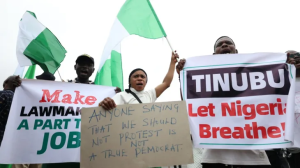The recent arrest of Dele Farotimi, a prominent human rights lawyer and political activist, has ignited a wave of controversy and public outcry across Nigeria. The incident has drawn attention to issues of police power and freedom of expression in the country.
The Arrest Incident
On December 3, 2024, CCTV footage surfaced showing the arrest of Dele Farotimi in Lagos by police operatives. The footage, shared by activist Aisha Yesufu, depicted three officers apprehending Farotimi at an office in Lekki Phase 1. Following his arrest, Farotimi was transported to Ekiti State for questioning.

Farotimi, who stepped away from legal practice in 2018 to avoid corruption in the judiciary, is facing charges of defamation and cyberbullying. These charges stem from remarks he allegedly made about Afe Babalola, a senior advocate of Nigeria. The Ekiti State Police Command confirmed his arrest and stated that he is undergoing interrogation.
Public Reaction and Political Backlash
The arrest has sparked significant backlash from various quarters, most notably from Peter Obi, a leading political figure and presidential hopeful. Obi condemned the arrest as an “abuse of power” and a “grave assault on democracy and justice.” He has called for Farotimi’s immediate and unconditional release.
In a statement on social media, Obi emphasized the importance of upholding democratic principles and protecting individuals’ rights to free speech. His response highlights broader concerns about the misuse of police authority in Nigeria.
Peter Obi’s statement on social media
Legal and Social Implications
The incident raises critical questions about the balance between law enforcement and civil liberties in Nigeria. Critics argue that Farotimi’s arrest is part of a pattern of intimidation tactics used against opposition figures and activists. This situation underscores ongoing tensions between government authorities and those advocating for social justice.
Dele Farotimi has been a vocal critic of governmental policies and has previously accused the United States of complicity in Nigeria’s political issues. His outspoken nature has made him both a target for authorities and a symbol for those demanding change.
The arrest of Dele Farotimi continues to be a focal point for discussions on human rights and governance in Nigeria. As public figures like Peter Obi rally for his release, the case serves as a reminder of the challenges faced by activists in their quest for justice and accountability.
The outcome of this situation will likely have significant implications for Nigeria’s political landscape and its commitment to democratic values.


